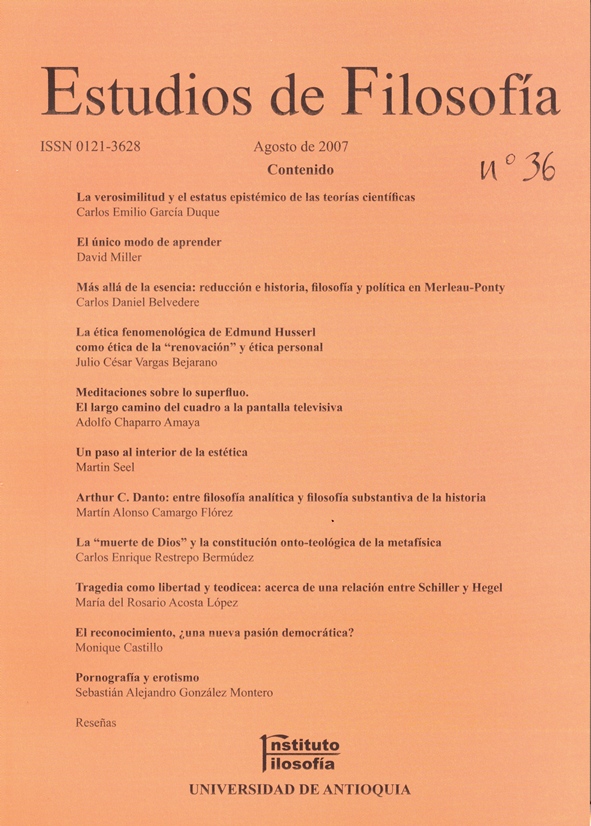The “Death of God” and the onto-theological constitution of metaphysics
DOI:
https://doi.org/10.17533/udea.ef.12743Keywords:
Metaphysics, Heidegger, Nietzsche, Modern Philosophy, Science of Logic, Hegel, GodAbstract
Heideggerian interpretation of the “Death of God” in Nietzsche entails the essential importance of a movement according to which Metaphysics is overcome. The said movement is verified in the most influential of modern Philosophies, mostly in the Philosophies of Kant and Hegel. In Heidegger’s words, after Nietzsche “the only road for Philosophy is its perversion and denaturalization, so we have no other alternatives in view for her”. This overcoming jeopardizes the whole of the History of Being that has taken place and enables the discovery, at the heart of the same Metaphysics, of its Onto-Theological constitution. This paper examines the “Death of God” in the light of the postulate of Onto-Theology as Essence of Metaphysics, and the consecuences therefrom derived for the thought of God in ContemporaryvPhilosophy.
Downloads
References
ARISTÓTELES. Metafísica. Edición trilingüe de Valentín García Yebra. Gredos, Madrid, 1998.
DERRIDA, J. Sauf le Nom. Galilée, Paris, 1993.
FEUERBACH, L. La esencia del Cristianismo. Trad. de José L. Iglesias. Trotta, Madrid, 1995.
HEGEL, G. W. F. Creer y saber. Trad. de Jorge Aurelio Díaz. Norma, Colección Cara y Cruz, Bogotá, 1992.
____________. Fenomenología del espíritu. Trad. de Wenceslao Roces. F. C. E., Bogotá, 1993.
____________. Ciencia de la Lógica. Trad. de Augusta y Rodolfo Mondolfo. Ediciones Solar/Hachette, Buenos Aires, 1968.
____________. Lecciones sobre filosofía de la religión. 3 tomos. Trad. de Ricardo Ferrera. Alianza, Madrid, 1987.
HEIDEGGER, M. La frase de Nietzsche “Dios ha muerto”. En: Caminos de bosque. Alianza, Madrid, 1995, pp. 190-240.
____________. La constitución onto-teo-lógica de la metafísica. En: Identidad y diferencia. Trad. de Helena Cortés y Arturo Leyte. Anthropos, Barcelona, 1990.
____________. La superación de la metafísica. En: Conferencias y artículos. Ediciones del Serbal, Madrid, 1994.
KANT, I. Crítica de la razón pura. Trad. de Pedro Ribas. Alfaguara, Madrid, 1998.
____________. Los progresos de la metafísica desde Leibniz y Wolff hasta nuestros Días. Trad. de Félix Duque. Tecnos, Madrid, 1990.
____________. La religión dentro de los límites de la mera razón. Trad. de Felipe Martínez Marzoa. Alianza, Madrid, 2001.
LEVINAS, E. Dios y la onto-teo-logía. En: Dios, la muerte y el tiempo. Trad. de María Luisa Rodríguez Tapia. Cátedra, Madrid, 1994.
____________. De Dieu qui vient à l’idée. Vrin, Paris, 1982.
MARION, J.-L. L’idole et la distance. Cinq études. Bernard Grasset, Paris, 1977. Versión castellana El ídolo y la distancia. Trad. de Sebastián M. Pascual y Nadia Latrille. Sígueme, Salamanca, 1999.
____________. Dieusansl ́être. Quadrige/ PUF, Paris, 1991; primera edición en Librairie Arthème Fayard, 1982.
____________. Généalogie de la “mort de Dieu”. Contribution à la détermination théologique des présupposés conceptuels de la “mort de Dieu” chez Hegel, Feuerbach, Stirner et Nietzsche. Résurrection, Paris, núm. 36, 1971, pp. 30-53.
____________.La fin de la metaphysique. En: Laval Theologique et Philosophique, Quebec, vol. 42 (1), febrero de 1986, pp. 22-33. DOI: https://doi.org/10.7202/400214ar
NIETZSCHE, F. Gaya ciencia. Bedout, Medellín, 1974.
____________. Así habló Zarathustra. Trad. de Andrés Sánchez Pascual. Alianza, Madrid, 1990.
____________. Fragmentos póstumos. Trad. de Germán Meléndez Acuña. Norma, Colección Cara y Cruz, Bogotá, 1992.
PAUL, J. Alba del nihilismo. Trad. de Jorge Pérez Tudela. Istmo, Madrid, 2005.
PASCAL, B. Obras. Trad. y notas de Carlos R. de Dampierre. Alfaguara, Madrid, 1981.
PLUTARCO. Obras morales y de costumbres. Edición de Manuela García Valdés. Akal, Madrid, 1987.
WAHL, J. Le malheur de la conscience dans la philosophie de Hegel. Les Éditions Rieder, Paris, 1929.
Downloads
Published
How to Cite
Issue
Section
Categories
License
Copyright (c) 2007 Carlos Enrique Restrepo Bermúdez

This work is licensed under a Creative Commons Attribution-NonCommercial-ShareAlike 4.0 International License.
Authors who publish with this journal agree to the following terms:
1. The Author retains copyright in the Work, where the term "Work" shall include all digital objects that may result in subsequent electronic publication or distribution.
2. Upon acceptance of the Work, the author shall grant to the Publisher the right of first publication of the Work.
3. The Author shall grant to the Publisher a nonexclusive perpetual right and license to publish, archive, and make accessible the Work in whole or in part in all forms of media now or hereafter known under a Creative Commons Attribution-NoCommercia-ShareAlike (CC BY-NC-SA 4.0), or its equivalent, which, for the avoidance of doubt, allows others to copy, distribute, and transmit the Work under the following conditions: (a) Attribution: Other users must attribute the Work in the manner specified by the author as indicated on the journal Web site;(b) Noncommercial: Other users (including Publisher) may not use this Work for commercial purposes;
4. The Author is able to enter into separate, additional contractual arrangements for the nonexclusive distribution of the journal's published version of the Work (e.g., post it to an institutional repository or publish it in a book), as long as there is provided in the document an acknowledgement of its initial publication in this journal;
5. Authors are permitted, and Estudios de Filosofía promotes, to post online the preprint manuscript of the Work in institutional repositories or on their Websites prior to and during the submission process, as it can lead to productive exchanges, as well as earlier and greater citation of published work (see The Effect of Open Access). Any such posting made before acceptance and publication of the Work is expected be updated upon publication to include a reference to the Estudios de Filosofía's assigned URL to the Article and its final published version in Estudios de Filosofía.















